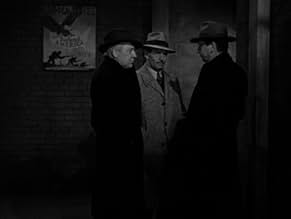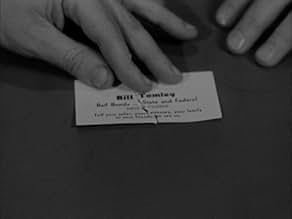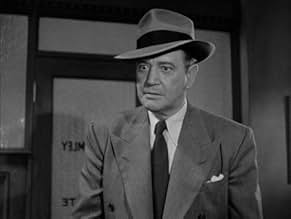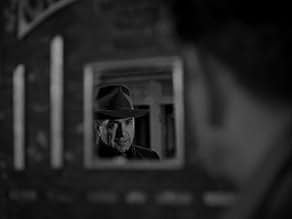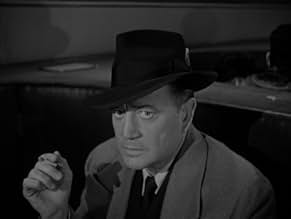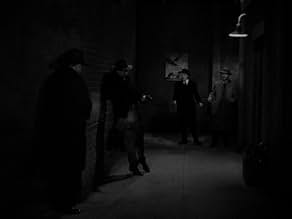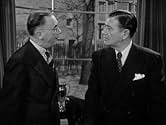CALIFICACIÓN DE IMDb
6.3/10
1.3 k
TU CALIFICACIÓN
Agrega una trama en tu idiomaA depressed man hires an assassin to kill him when he least expects it, but when his life takes an upward turn, he finds he now wishes to live.A depressed man hires an assassin to kill him when he least expects it, but when his life takes an upward turn, he finds he now wishes to live.A depressed man hires an assassin to kill him when he least expects it, but when his life takes an upward turn, he finds he now wishes to live.
- Dirección
- Guionistas
- Elenco
Trevor Bardette
- The Bum in the Next Bed
- (sin créditos)
William 'Billy' Benedict
- The Deafmute
- (sin créditos)
Willie Bloom
- Bum
- (sin créditos)
Roy Brent
- Detective in Alley
- (sin créditos)
Charles Coleman
- Jennings the Butler
- (sin créditos)
Clancy Cooper
- Telephone Repairman
- (sin créditos)
Don Costello
- Lefty Vigran aka Gorss
- (sin créditos)
Russell Custer
- Bar Patron
- (sin créditos)
Ralph Dunn
- Cop at Car Accident
- (sin créditos)
Otto Forrest
- The Whistler
- (sin créditos)
Byron Foulger
- Flophouse Desk Clerk
- (sin créditos)
John George
- Bum
- (sin créditos)
Dick Gordon
- Tomley's Assistant
- (sin créditos)
Robert Homans
- Dock Watchman
- (sin créditos)
- Dirección
- Guionistas
- Todo el elenco y el equipo
- Producción, taquilla y más en IMDbPro
Opiniones destacadas
Solid, low-budget film noirish yarn about a man who takes out a contract on himself and then through a reversal of fortune decides against it. The Whisteler open up the film with that delightfully creepy little tune and a brief narrative and the reigns are handed over to a competent corp of character actors(and Richard Dix and Gloria Stuart). Dix plays the lead well-enough though incredibly lethargically. He literally looks like he hasn't slept in days. Stuart is peppy and pretty in a smallish role, but J. Carrol Naish does an outstanding job as the contracted killer. He gives a layered performance is what was a truly difficult role. The film barely spans an hour and ten minutes or so but never lags. we get suspense, action, and answers rather quickly. The Whistler has a much more subdued role then what you would hear in the radio series. This film would go on to spawn many sequels and was one of the earliest directorial forays of horror icon William Castle. Castle, as always, does a more than workmanlike job.
The "Whistler" was very odd for a B-movie series and so much unlike its contemporaries (such as Charlie Chan or The Falcon). Richard Dix starred in 8 of the 9 films. though he played a totally different character in each--sometimes a good guy and other times a bad one. In many ways, this is reminiscent of Universal's INNER SANCTUM series in that the same actor often played different roles in each film AND the series was NOT the standard detective film but an anthology series--much like TV's TWILIGHT ZONE. The "Whistler" in the titles of most of the films is an unseen guy in the shadows that narrates the film and occasionally makes comments during the film. This format was apparently created for the radio version of "The Whistler".
In this first of the series, Dix plays a depressed man who, instead of suicide, pays an unknown assassin to kill him!! While the whole idea is ridiculous and contrived, it is pretty entertaining--especially when Dix changes his mind and truly wants to live but he isn't sure who is coming to kill him or how to stop the contract! The biggest negative, other than the silliness of the story, was the narration by The Whistler. This narrator talks too much--sometimes making comments or saying things that were obvious to the viewer. I haven't seen the rest of the series, but surely hope this was corrected.
In this first of the series, Dix plays a depressed man who, instead of suicide, pays an unknown assassin to kill him!! While the whole idea is ridiculous and contrived, it is pretty entertaining--especially when Dix changes his mind and truly wants to live but he isn't sure who is coming to kill him or how to stop the contract! The biggest negative, other than the silliness of the story, was the narration by The Whistler. This narrator talks too much--sometimes making comments or saying things that were obvious to the viewer. I haven't seen the rest of the series, but surely hope this was corrected.
This unusual Film Noir (the only one ever to be made into a whole series of films) certainly catches the sinister atmosphere of its genre, both visually with very well done shadow effects and the adequate 'cheap' harbor surroundings of a B movie, and thematically, using a lot of psychology which doesn't fail to have its effects, neither on the protagonists nor on the audience - but just a little bit of an overdose of the belief in 'destiny'...
Whose destiny is it to live or to die? Who has a 'right' to live or to die? Questions like these are maybe somehow out of place in a Film Noir - because they've got too much to do with morality. The Noir world (at least that of the 40s) is usually quite immoral (see "The Maltese Falcon", "The Shanghai Gesture", "Gilda"); and it's not always the good ones who get away - that's the cynical Noir philosophy...
But anyway, "The Whistler" still remains an enormously suspenseful film with a very capable cast and direction; and a 'must' for every fan of classic crime.
Whose destiny is it to live or to die? Who has a 'right' to live or to die? Questions like these are maybe somehow out of place in a Film Noir - because they've got too much to do with morality. The Noir world (at least that of the 40s) is usually quite immoral (see "The Maltese Falcon", "The Shanghai Gesture", "Gilda"); and it's not always the good ones who get away - that's the cynical Noir philosophy...
But anyway, "The Whistler" still remains an enormously suspenseful film with a very capable cast and direction; and a 'must' for every fan of classic crime.
A man (Richard Dix) is despondent after the death of his wife but can't bring himself to commit suicide.. So he hires a professional hit-man (J. Carrol Naish) to do the deed for him. But suddenly things are looking up for him and he wants to live. The problem is he has a killer after him that he already paid for! An outlandish premise but a fun start to Columbia's Whistler series. The Whistler was a popular radio program of the time. I am way too young to remember the radio show when it first aired, but I have heard many episodes on satellite radio. It's a good show. The movie series is good, as well, with iron-jawed Richard Dix playing the lead in all but one of them. He plays a different role in each movie, just like Lon Chaney, Jr. was doing over at Universal in their Inner Sanctum series.
Like I said, this is a fun movie despite the unbelievable premise. Nice supporting cast backing up Dix including Gloria Stuart, Alan Dinehart, William Benedict, and J. Carrol Naish. Benedict first appears on screen reading a Superman comic book. This has to be one of the earliest appearances or mentions of Superman in a live-action movie. It's also one of the earliest directing jobs from William Castle.
Like I said, this is a fun movie despite the unbelievable premise. Nice supporting cast backing up Dix including Gloria Stuart, Alan Dinehart, William Benedict, and J. Carrol Naish. Benedict first appears on screen reading a Superman comic book. This has to be one of the earliest appearances or mentions of Superman in a live-action movie. It's also one of the earliest directing jobs from William Castle.
This movie is the first installment of The Whistler series from Columbia Pictures, all but one of which starred Richard Dix whose A-picture career was then on an alcoholic downgrade, but whose liquor-ravaged face was just right for the overall atmosphere. (For a complete list of series titles, consult "movie connections" on web page.) Of all the movie series to emerge from the 30's and 40's, this is easily one of the most fascinating and unusual. Each entry presents a different self-contained story, tied together only by the mysterious figure of The Whistler who comments briefly on plot developments, but appears only in shadow to whistle his trademark refrain. He seems to be a figure of fate since the hand of destiny emerges in most of the entries. But most importantly, the plots follow no formula (unusual for any series) and are entirely unpredictable in their outcome. This unpredictability is what distinguishes the series from others of the time.You really don't know what's going to happen or how each episode will turn out. Moreover, there's a strong noirish quality to many of the entries, with a suspenseful atmosphere, an underlying sense of doom, and imaginative characters and plot twists. All in all, the productions are a first cousin to the celebrated Val Lewton horror cycle from RKO, minus the supernatural. I'm surprised that with all the scholarly interest in film noir, that this noirish series has not received the critical attention it merits.
Though weaker in many ways (the script appears put together on the fly), this initial entry contains many features generic to the others. Dix, a prosperous manufacturer, arranges for his own death following the presumed death of his beloved wife, only to find out ironically that she is not dead. The problem is he can't undo the arrangement and is thus forced to escape through the labyrinthine venues of the city's skid row. The entire 60 minutes has something of a nightmarish quality since it starts off with Dix expecting death, though in what form, he can't be sure. Looking convincingly like a real bum, it's Dix's tour through the seedy parts of the city that really commands attention, especially the 25-cent flop-house with its rows of coffin-like cots, snoring vagrants, and sneak thief. You can almost smell the rot-gut whiskey peeling off the walls. The sets are bare-bones, the cafes, bars, and city sidewalks sometimes suggesting the unadorned depths of urban despair. Unfortunately, the ending is abrupt and disappointing. It's almost as though the production suddenly ran out of film and had to wrap it up right then. Nonetheless, many of the distinctive elements of the productions are already present. Unfortunately copies of the series are hard to obtain ( my own burned in a house fire some time ago). So let's hope our friends on cable TV follow up on this initial entry some time soon. It's well worth tuning in.
Though weaker in many ways (the script appears put together on the fly), this initial entry contains many features generic to the others. Dix, a prosperous manufacturer, arranges for his own death following the presumed death of his beloved wife, only to find out ironically that she is not dead. The problem is he can't undo the arrangement and is thus forced to escape through the labyrinthine venues of the city's skid row. The entire 60 minutes has something of a nightmarish quality since it starts off with Dix expecting death, though in what form, he can't be sure. Looking convincingly like a real bum, it's Dix's tour through the seedy parts of the city that really commands attention, especially the 25-cent flop-house with its rows of coffin-like cots, snoring vagrants, and sneak thief. You can almost smell the rot-gut whiskey peeling off the walls. The sets are bare-bones, the cafes, bars, and city sidewalks sometimes suggesting the unadorned depths of urban despair. Unfortunately, the ending is abrupt and disappointing. It's almost as though the production suddenly ran out of film and had to wrap it up right then. Nonetheless, many of the distinctive elements of the productions are already present. Unfortunately copies of the series are hard to obtain ( my own burned in a house fire some time ago). So let's hope our friends on cable TV follow up on this initial entry some time soon. It's well worth tuning in.
¿Sabías que…?
- TriviaFirst of eight entries in the "Whistler" series, released from 1944 to 1948, and Richard Dix appeared in all but the last one. Unusually, he played a different character in each.
- ErroresWhile the killer is lying on the bed perusing his book on Fear of Death, a cigarette suddenly appears in his mouth.
- Citas
The Bum in the Next Bed: Rats in this place as big as beavers. They won't hurt ya... but you're liable to trip over them in the dark.
- ConexionesFeatured in Spine Tingler! The William Castle Story (2007)
Selecciones populares
Inicia sesión para calificar y agrega a la lista de videos para obtener recomendaciones personalizadas
Detalles
- Fecha de lanzamiento
- País de origen
- Idioma
- También se conoce como
- Pacto con la muerte
- Locaciones de filmación
- Productora
- Ver más créditos de la compañía en IMDbPro
- Tiempo de ejecución
- 59min
- Color
- Relación de aspecto
- 1.37 : 1
Contribuir a esta página
Sugiere una edición o agrega el contenido que falta

